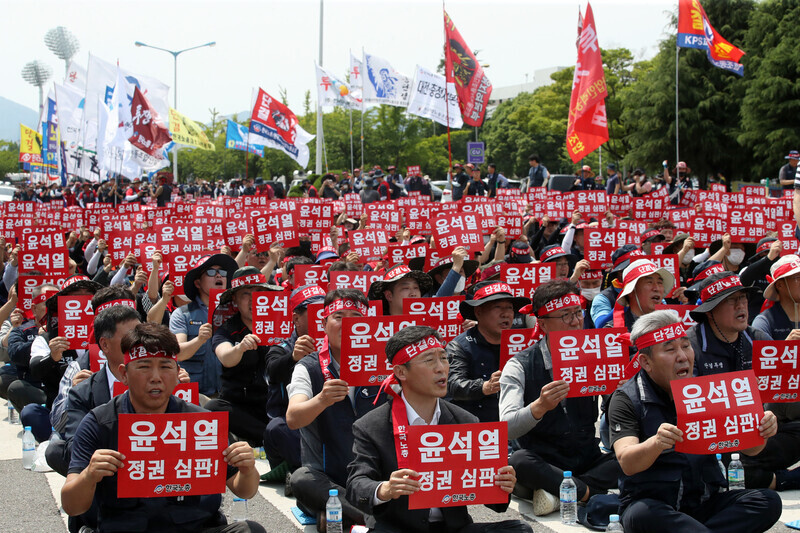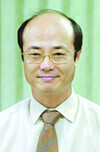hankyoreh
Links to other country sites 다른 나라 사이트 링크
[Column] Yoon’s questionable pursuit of rule of law


By Seong Han-yong, senior political writer
In his New Year’s address this year, South Korean President Yoon Suk-yeol said that labor reform was among his top priorities. Labor reform should begin, he said, with establishing the rule of law in labor relations. He said that basing labor relations on the rule of law was the way to prevent unnecessary conflict and labor actions and to truly respect the value of labor.
While I didn’t agree with that position, it appeared to have a certain logic.
Yoon singled out a rally in downtown Seoul by the Korean Construction Workers’ Union, which is affiliated with the Korean Confederation of Trade Unions, for harsh criticism during a Cabinet meeting on May 23.
“Guaranteeing the freedom to hold assemblies and demonstrations should not be taken as justifying behavior that violates other people’s freedoms and basic rights or erodes public order,” he said in the meeting.
Once again, I didn’t agree with that position, but it did appear to have a certain logic.
But the next thing Yoon said is where things got weird.
“Because the previous administration [of Moon Jae-in] basically stopped enforcing the law in regard to illegal assemblies and illegal demonstrations, we’ve reached the point where public inconvenience is nearly unbearable, with protestors shouting into megaphones and occupying the streets,” he said.
Does it actually make sense for Yoon to blame his predecessor for the police force’s inability to properly enforce the law in assemblies and demonstrations?
Regardless, Yoon’s stern orders were immediately put into effect.
Yoon Hee-keun, commissioner general of the National Police Agency, showed up in riot gear at a security meeting at Seoul’s Namdaemun Police Department before a KCTU rally on May 31. He instructed local commanders to use tear gas at their discretion. Things have certainly changed since the Itaewon crowd crush.
The police have also adopted very different methods of crowd control. They immediately dismantled an altar that the KCTU had set up to memorialize the late Yang Hoe-dong, a unionist who self-immolated on May Day. And when Kim Jun-yeong, secretary general of the Federation of Korean Metalworkers’ Trade Unions, tried to resist arrest during an aerial protest at POSCO’s Gwangyang steelworks, the police bashed his head with truncheons.
It\'s debatable whether the police went too far in these actions. Officers of the law can’t simply stand by while the law is flouted. They’re supposed to enforce the law sternly but objectively, according to their guidelines and their assessment of the situation. That’s why we need a highly trained police force.
But police officers are people, too. If the president and police chief keep pushing them like this, there’s a growing chance that somebody will snap. That approach also puts police officers themselves in greater danger. It worries me.
Let’s suppose, for the sake of argument, that these police crackdowns are acceptable. But what about the labor reform that Yoon has publicly pledged? Labor reform requires dialogue and consent from organized labor, big business, and the government, as well as legislation in the National Assembly.
In an emergency meeting of its central executive committee on June 7, the Federation of Korean Trade Unions (FKTU) decided to boycott the Economic, Social and Labor Council, a consultative body between the government, companies, and labor unions. That’s the first time in nearly seven and a half years that the Korean body for social dialogue has closed down.
Yoon might have a trick up his sleeve, but I don’t think so. The government and ruling party don’t even seem concerned about this turn of events. At this point, I find myself wondering whether Yoon was even being honest when he said in his New Year’s address that basing labor relations on the rule of law is the starting point of labor reform.
Perhaps Yoon has all along been hoping to exploit antipathy for labor unions and inter-union conflict to galvanize his base and achieve victory in next year’s general election.
Yoon sacked Han Sang-hyuk, chairperson of the Korea Communications Commission (KCC), two months before the end of his term. The reason given for his termination was that Han had been “responsible for supervision and oversight” and that “it was impossible for Han to carry on his normal work responsibilities when he was being prosecuted for personally committing a serious crime.” Once again, Yoon is doing things “by the book.”
A court will soon decide whether Han’s termination was legally appropriate. When the Ministry of Justice gave Yoon a two-month suspension from his duties as prosecutor-general back in 2020, Yoon filed a lawsuit in which he successfully argued that the suspension should be reversed.
But it’s still a mystery what Yoon stood to gain politically from firing Han. The answer may lie in the appointment of his successor.
Lee Dong-gwan, who chaired the special committee for media and communication in Yoon’s presidential campaign, is being floated as a potential replacement for Han at the KCC. Lee’s current role is special presidential aide for external cooperation.
If true, that means a special aide to the president will be parachuted into the chairmanship of the KCC despite the critical importance of that agency’s independence from the government.
That’s why I find myself wondering whether Han may have been sacked to lay the groundwork for bringing the broadcast sector under Yoon’s thumb.
Laws are the minimum norms required to preserve the community. The community cannot be preserved without the law, but neither can the community be preserved by the law alone.
It’s only natural that the justice minister, the prosecutor general and the chief of police would prioritize the rule of law. But the president is a politician. As the person responsible for running the country, he needs to broaden his scope beyond the rule of law. He’s supposed to unfurl a vision, mediate conflict, and engineer grand bargains in society.
Those are things that only the president can do, things the president must do. Is Yoon capable of them?
Please direct questions or comments to [english@hani.co.kr]

Editorial・opinion
![[Column] Has Korea, too, crossed the Rubicon on China? [Column] Has Korea, too, crossed the Rubicon on China?](https://flexible.img.hani.co.kr/flexible/normal/500/300/imgdb/original/2024/0419/9317135153409185.jpg) [Column] Has Korea, too, crossed the Rubicon on China?
[Column] Has Korea, too, crossed the Rubicon on China?![[Correspondent’s column] In Japan’s alliance with US, echoes of its past alliances with UK [Correspondent’s column] In Japan’s alliance with US, echoes of its past alliances with UK](https://flexible.img.hani.co.kr/flexible/normal/500/300/imgdb/original/2024/0419/2317135166563519.jpg) [Correspondent’s column] In Japan’s alliance with US, echoes of its past alliances with UK
[Correspondent’s column] In Japan’s alliance with US, echoes of its past alliances with UK- [Editorial] Does Yoon think the Korean public is wrong?
- [Editorial] As it bolsters its alliance with US, Japan must be accountable for past
- [Guest essay] Amending the Constitution is Yoon’s key to leaving office in public’s good graces
- [Editorial] 10 years on, lessons of Sewol tragedy must never be forgotten
- [Column] A death blow to Korea’s prosecutor politics
- [Correspondent’s column] The US and the end of Japanese pacifism
- [Guest essay] How Korea turned its trainee doctors into monsters
- [Guest essay] As someone who helped forge Seoul-Moscow ties, their status today troubles me
Most viewed articles
- 1[Column] The clock is ticking for Korea’s first lady
- 2After 2 months of delayed, denied medical care, Koreans worry worst may be yet to come
- 3Hong Se-hwa, voice for tolerance whose memoir of exile touched a chord, dies at 76
- 4[Column] Has Korea, too, crossed the Rubicon on China?
- 5US overtakes China as Korea’s top export market, prompting trade sanction jitters
- 6Samsung barricades office as unionized workers strike for better conditions
- 7[Editorial] As it bolsters its alliance with US, Japan must be accountable for past
- 8[Correspondent’s column] In Japan’s alliance with US, echoes of its past alliances with UK
- 9All eyes on Xiaomi after it pulls off EV that Apple couldn’t
- 10[Correspondent’s column] The US and the end of Japanese pacifism